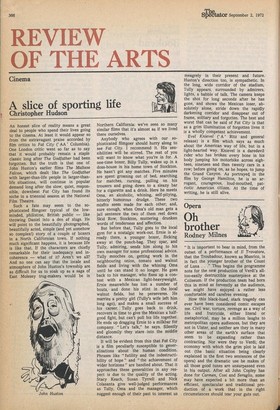REVIEW OF THE ARTS
Cinema
A slice of sporting life
Christopher Hudson
An honest slice of reality means a great deal to people who spend their lives going to the cinema. At least it would appear so from the extravagant praise accorded by film critics to Fat City (' AA ' Columbia). One London critic went so far as to say that ' it would probably remain a staple classic long after The Godfather had been forgotten. But the truth is that one of John Huston's earlier films The Maltese Falcon, which dealt like The Godfather with larger-than-life people in larger-thanlife situations, will continue in popular demand long after the slow, quiet, responsible, downbeat Fat City has found its niche in a triennial season at the National Film Theatre.
Such a fate may seem to the sophisticated filmgoer typical of the lowminded, philistine, British public — like throwing Daniel into a den of slugs. He will point to the beautifully photographed, beautifully acted, simple (and yet somehow so complex!) story of a couple of boxers in a North Californian town. If nothing much significant happens, it is because life is like that. If the characters are chiefly remarkable for their inadequacy and incoherence — what of it? Aren't we all? And no one can say that the locale and atmosphere of John Huston's township are as difficult for us to soak up as a saga of East Molesey trug-makers would be in Northern California: we've seen so many similar films that it's almost as if we lived there ourselves.
Anybody who agrees with our sophisticated filmgoer should hurry along to see Fat City. I recommend it. His sensibilities will be stirred. The rest of you will want to know what you're in for. A one-time boxer, Billy Tully, wakes up in a doss-house in his home town of Stockton. He hasn't got any matches. Five minutes are _spent groaning out of bed, searching for matches, cursing, pulling on his trousers and going down to a sleazy bar for a cigarette and a drink. Here he meets Oma, an alcoholic, whining, self-pitying, bitterly humorous drudge. These two misfits seem made for each other; and, sure enough, when Oma's old man gets a jail sentence the two of them reel down Skid Row, Stockton, muttering drunken words of tenderness and affection.
But before that, Tully goes to the local gym for a nostalgic work-out. Ernie is already there, a younger boxer, flicking away at the punch-bag. They spar, and Tully, admiring, sends him along to his own manager for some professional advice. Tully mooches on, getting work in the neighbouring onion, tomato and walnut fields and living with the whining Oma until he can stand it no longer. He goes back to his manager, who fixes up a contest with a Mexican light-heavyweight. Ernie meanwhile has lost a number of bouts, and done his stint in the local walnut fields, but he perseveres. He marries a pretty girl (Tully's wife left him long ago), and makes a small success of his career. Tully goes back to drink, recovers in time to give the Mexican a halfgood fight, but can't pull his life together. He ends up dragging Ernie to a milkbar for company. "Let's talk," he says. Silently and gloomily they stare into the middle distance.
It will be evident from this that Fat City is a film peculiarly susceptible to generalisations about the human condition. Phrases like "futility and the indestructibility of hope" and "the achievement of wider horizons" are bandied about. That it approaches these generalities in any respect is due to the quality of the acting. Stacy Keach, Susan Tyrrell and Nick Colasanta give well-judged performances as Tully, Oma and the manager, which suggest enough of their past to interest us
meagrely in their present and future. Huston's direction too, is sympathetic. In the long, wide corridor of the stadium, Tully appears, surrounded by admirers, lights, a babble of talk. The camera keeps the shot for long seconds after he has gone, and shows the Mexican loser, absolutely alone, stride down the rapidly darkening corridor and disappear out of frame, solitary and forgotten. The best and worst that can be said of Fat City is that as a grim illumination of forgotten lives it is a wholly competent achievement.
Eve! Knievel (' A ' Ritz and general release) is a film which says as much about the American way of life, but in a light-hearted way. Knievel is a daredevil rider who has broken every bone in his body jumping his motorbike across eighteen, nineteen and then twenty cars in a row; before going on, as he hopes, to jump the Grand Canyon. As portrayed in the film by George Hamilton, he is an arrogant, courageous, loud-mouthed, patriotic American citizen. At the time of writing, he is still alive.






































 Previous page
Previous page